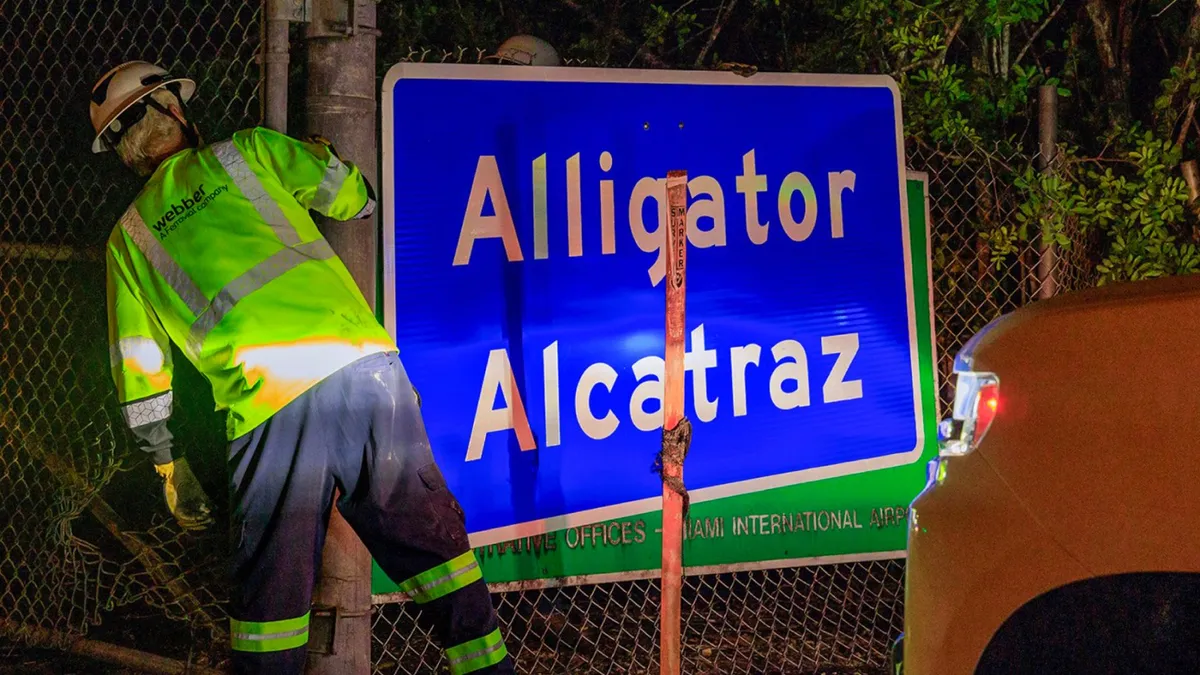
Experts are raising alarms about the dangerous conditions at Alligator Alcatraz, the newly opened immigrant detention center located in the Florida Everglades. Despite its ominous name, the real threats to those incarcerated here stem from environmental factors such as hurricanes, flooding, and rampant mosquito populations, rather than the alligators and snakes that have been the subject of jokes from former President Donald Trump.
Alligator Alcatraz was constructed in a mere eight days and consists of large tents, bunk beds, and chain link fences, designed to accommodate approximately 3,000 individuals. Alarmingly, the facility has already experienced flooding, raising questions about its ability to withstand severe weather. Despite its basic setup, the operation of this detention center is projected to cost an astounding $450 million annually, as reported by Department of Homeland Security Secretary Kristi Noem.
The Florida Division of Emergency Management has confirmed that the first group of immigrants has already been transported to Alligator Alcatraz. In a recent post on X, the division stated, “Florida is proud to help facilitate @realDonaldTrump’s mission to enforce immigration law.” This sentiment reflects a broader trend among Florida Republicans who view the facility's harsh environment as a deterrent for potential immigrants.
Critics of Alligator Alcatraz emphasize the facility's remote and isolated location, which significantly hampers access for lawyers, family members, and oversight bodies. Renata Bozzetto, the deputy director of the Florida Immigrant Coalition, shared her concerns with The Washington Post, stating, “The location being so remote and isolated is a problem. Being in an environmentally fragile ecosystem is a problem. Being constructed with temporary materials will be catastrophic in case of a hurricane.” This raises serious questions about the treatment and rights of individuals detained at this facility.
Alligator Alcatraz is situated in a High-Velocity Hurricane Zone, where local building codes mandate that structures must be wind-resistant. Florida’s Emergency Management Director, Kevin Guthrie, noted that the buildings are rated to withstand winds of up to 110 miles per hour. However, this is concerning given that last year’s Hurricane Milton reached top speeds of 180 miles per hour.
The presence of mosquitoes in the Everglades presents another significant health risk for those detained. Durland Fish, a professor emeritus of epidemiology at the Yale University School of Public Health, highlighted the serious potential for mosquito-borne diseases, stating, “The risk of mosquito-borne disease at this site is significant.” Conditions in the area can lead to severe health issues, including neurological damage and encephalitis, which can be life-threatening.
Florida Representative Anna Eskamani voiced her frustration after being denied entry to the facility alongside four other Democrats. She noted the extreme conditions, stating, “The second you open up your car, your car is infested with mosquitoes.” Eskamani was equipped with a mosquito net but still endured numerous bites. State Senator Shevrin Jones echoed her concerns, emphasizing that Florida law permits legislators to make unannounced visits to state-run facilities, stating, “This is a blatant abuse of power and an attempt to conceal human rights violations from the public eye.”
The construction of Alligator Alcatraz has garnered enthusiastic support from Republican leaders in Florida, with the state Republican Party even marketing merchandise promoting the detention center. Furthermore, reports from Rolling Stone have indicated that some donors are benefiting financially from the camp's operations. For instance, the president of CDR Companies, which has been involved in providing medical services and site preparation for the facility, has made contributions to both President Trump and Florida Governor Ron DeSantis.
As concerns about the inhumane conditions and potential health risks at Alligator Alcatraz continue to mount, the debate surrounding immigration enforcement and the treatment of detainees remains at the forefront of Florida's political landscape.